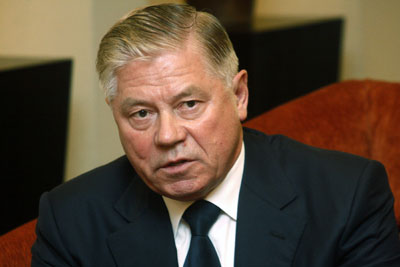At the end of our recent mission to Moscow, our delegation squeezed in one final official meeting. Vyacheslav M. Lebedev, the chief justice of Russia’s Supreme Court, had sent word only the night before that he would receive us. The meeting had been brokered by Aleksei Venediktov, the legendary founder of the radio station Ekho Moskvy, who told us that Lebedev had a keen interest in freedom of expression issues.
Indeed, Lebedev not only affirmed this commitment, he drew a strong parallel between the role of journalists and the role of judges in mediating between competing forces within society. “The independence of journalists is just as important as the independence of judges,” he proclaimed.
But it has been an uphill struggle to educate Russian judges about the role of the media in promoting accountability and openness, Lebedev told us. He pointed to several decrees promulgated by the Supreme Court mandating public access to legal proceedings. He gave us a copy of a June 15 resolution guaranteeing media access that had been translated for the first time into English. I promised to post it to our website, in case it was of interest to international legal observers, and it is now available here.
I was somewhat surprised by Lebedev’s effort to make common cause with CPJ. He even explained that Russian judges had also been murdered with impunity and asked me if I could suggest strategies for pursuing justice based on CPJ’s experiences.
The Russian government has been consistently hostile to criticism of its human rights record, particularly when that criticism comes from international NGOs. Somehow, the notion that CPJ had come to Russia to pursue justice on behalf of our murdered colleagues seemed less threatening. We had already noticed this during our meeting with top investigators several days earlier. The chairman of the Investigative Committee, Aleksandr Bastrykin, told our delegation in an earlier meeting that he was open to CPJ because we were focused on pursuing justice and promoting the rule of law rather than human rights. Of course, CPJ is a human rights organization when it serves our purposes. But if Russian authorities felt more comfortable dealing with us as a group with a more narrow justice agenda, that was fine with us.
The Russian criminal justice system is opaque and highly politicized. It has failed to identify and prosecute the killers of 19 journalists murdered for their work in Russia since 2000. But we had to give the chief justice credit on one point: Courtrooms are open. We saw this for ourselves on September 28, when we paid a visit to the cramped courtroom in downtown Moscow where Oleg Orlov, the head of the human rights organization Memorial, is facing criminal defamation charges brought by Chechen President Ramzan Kadyrov.
When journalist and human rights activist Natalya Estemirova was killed in July of 2009, Orlov lashed out at Kadyrov, calling him responsible for her murder. Kadyrov, who had previously bragged about his own role in killing Chechen rebels and has been linked to numerous grave human rights abuses, was a frequent subject of Estemirova’s exposés.
Kadyrov has already won a civil suit against Orlov and is now pursuing criminal action. The only positive note in this outrageous case was that the proceedings were indeed open not only to us, but to human rights activists, journalists and international diplomats.
I asked Chief Justice Lebedev his opinion about criminal libel and Kadyrov’s lawsuit against Orlov. Not surprisingly, he said he could not comment on any case that might come before the court and did not want to be seen as giving legal advice. But he said that, in his capacity as a public official, he would never personally pursue a criminal libel case. Regarding criticism of public figures in the media, he said, “As someone who holds a high office, you simply have to bear it.”
Lebedev had been described to me as a charming political survivor. He has presided over Russia’s Supreme Court since 1989 and served under four presidents: Gorbachev, Yelstin, Putin and now Medvedev. When I told him that we were afraid the Moscow traffic would make us late for our press conference, he smiled knowingly. He escorted us out of the ornate meeting room, through the modern building and into the street, then stood waving to us as our van pulled away from the curb. A police escort pulled up in front and, with its sirens blaring, guided us through the congested Moscow streets and delivered us to our press conference right on time.
